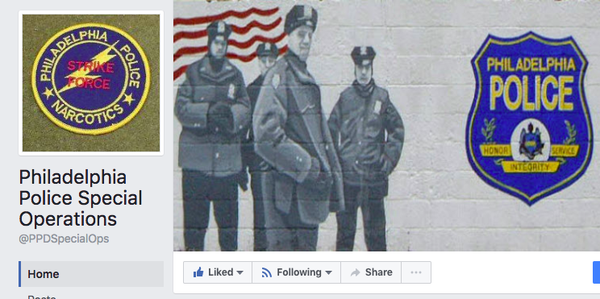An online petition is calling for a Philadelphia Police Department Facebook page to stop posting mug shots of accused drug dealers. But police say they're in a lose-lose situation when it comes to releasing those photos.
The petition, which had a little more than 300 signatures as of Friday morning, specifically targets the department's special operations page where police regularly post the names and ages of alleged dealers, as well as the dates and locations of their arrests.
- RELATED STORIES
- Gov. Wolf vetoes bill to protect identities of officers in police-involved shootings
- Report: Cheating, misconduct at Pennsylvania police academy
- New Jersey court: Police with warrant can view private Twitter messages
"Public shaming of people charged with crimes is an invasion of their privacy, keeps no one safe, and it is not a way that police departments can build trust with the communities they are sworn to protect and defend," the petition reads. It calls for Commissioner Richard Ross to implement a policy of keeping all mug shots off social media.
Posting photos of accused criminals to social media is a common practice among law enforcement agencies across the country, however, the frequency varies among agencies.
In many cases, police departments will post photos of alleged criminals when they are seeking the public's assistance in locating the suspect.
All of the photos on the special operations Facebook page are of people who have already been arrested, and none provide any detailed information about each suspect's alleged crime, other than the location and date.
Putting the mug shots on social media puts the suspects and their families at risk of harassment, according to the petition, which was launched by the Media Mobilizing Project.
Hannah Jane Sassaman, policy director for MMP, said the page was "beneath the dignity" of police and does not protect public safety.
"It's putting them in extraordinary danger," Sassaman said. "It serves as digital stocks in the courtyard of the city."
Sassaman said those whose mug shots are featured on the page have already been arrested, so they are either in jail, being electronically monitored or have been released on their own recognizance because they have not been deemed a threat to their community. She added that Facebook users will often leave nasty and derogatory comments on the mug shots.
Therefore, Sassaman asserts, the page amounts to nothing more than "public shame and ridicule."
Lt. John Stanford said it has nothing to do with shaming. He noted the department's been giving out mug shots for decades, including for non-violent crimes.
"It's baffling to me that people are up in arms about certain mug shots," said Stanford, who said he hadn't heard from anyone at MPP about the concern. "You get this pushback from people who have no relationship with us. Nobody has called me. The only people that have called is the media."
Stanford also noted that the mug shots are public record, and that often the criticism of police is that they aren't open enough with information. Police, he said, can rarely pick and choose what to give out and not give out.
The department does take steps to protect certain individuals when it comes to releasing photos and identifying information. During prostitution stings, for example, the johns' information and photos are released, but not that of the prostitutes, who may likely be victims of human trafficking.
In the case of alleged drug dealers, Stanford said the department actually often is thanked by residents of the neighborhoods where the dealers are arrested for helping keep drugs off the streets.
"It's really small minded to think that we are putting up photos to shame people," Stanford said. "All communication is done via social media. You're not going to make everybody happy with everything you do."

